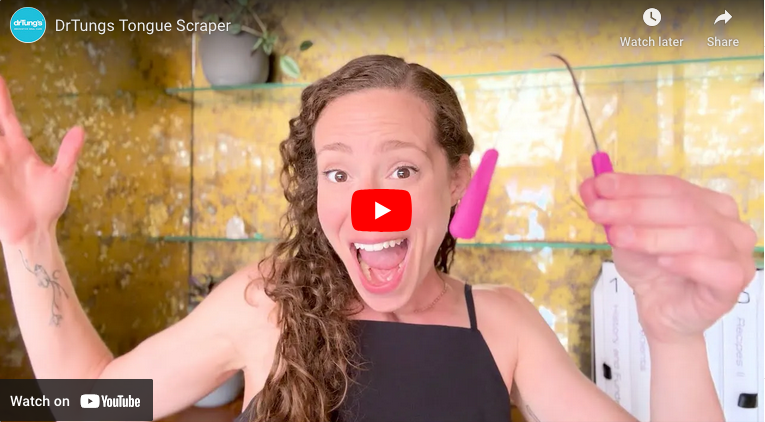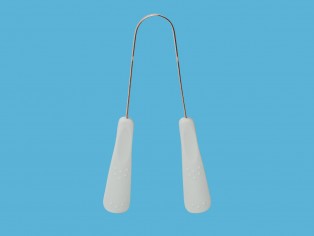Tongue Cleaning : To Scrape or to Brush?
You may have heard that tongue cleaning should be an integral part of your oral care routine for maintaining optimal oral health. But, what’s the best way to cleanse — should you be tongue scraping or tongue brushing? Why do you need a tongue scraper…can’t you just use a toothbrush to brush your tongue?
Everyone can benefit from this essential, daily dental hygiene habit and we’re here to help you sort it all out.
So what is the best practice? Let’s take a look…
Which is more effective — a tongue scraper or a tongue brush?
First let's talk about the difference between the two methods...
The tongue cleaner is a simple tool, often made from materials like stainless steel, copper, or plastic. Its shape is usually a flat, U-shaped curve designed specifically to fit the contours of the tongue. Some are flexible, while others have a more rigid design.
In contrast, the tongue brush looks more like a toothbrush but with softer, shorter bristles. Some are standalone brushes, while others come as attachments on the back of toothbrush heads. The design of a tongue brush is intended to scrub rather than scrape, with a large surface area covered by bristles to engage more of the tongue at once.
How does one stack up against the other?
To really understand this, we need to take a closer look at the various textures and surfaces inside our mouths, especially when it comes to our teeth and tongue. These areas aren't all the same—some are smooth, some are rough, and each one has its own unique needs when it comes to cleaning. By exploring these different textures and surfaces, we can get a better sense of which tools work best for which areas, ensuring that we're using the right tool for the job every time.
Teeth
Our teeth are bumpy, hard, individual and separated. There are large or small spaces between each one where plaque, bacteria, viruses and fungi can hide and flourish. That’s why a toothbrush has bristles; mainly to reach into the gaps, and remove these bugs. A toothbrush also ‘scrubs’ the hard tooth surface.
Tongue
Our tongue, on the other hand, is like a plush carpet. Its “pile” creates small crooks and crevices. Its warmth, wetness and valleys are the perfect breeding ground for certain bacteria, and unlike teeth, the tongue is soft.
Hundreds of sharp, pokey bristles may work well for tough teeth. However, like trying to clean a carpet with a broom, trying to clean the tongue with a toothbrush is ineffective and may even be harmful.
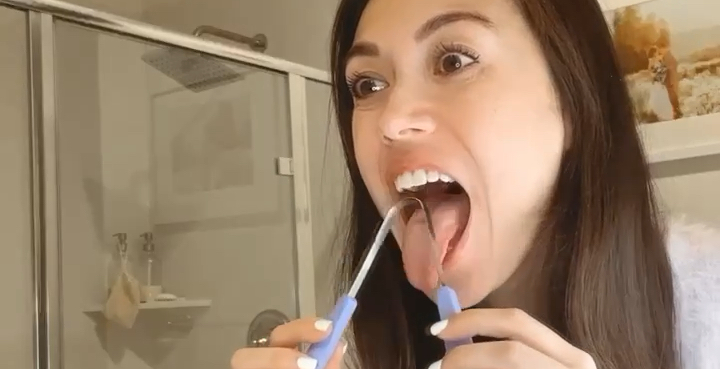
Scraping vs Brushing: The Tongue Scraper Claims Victory!
The tongue scraper is the clear winner as the best, most effective and safest way to clean your tongue.
How do you choose the best tongue scraper?
A well-designed tongue scraper is curved, with a smooth and flat edge. This allows it to evenly spread out the pressure, which reduces or eliminates the gag reflex. As you gently scrape from the very back all the way to the front, it easily and effectively removes the white coating of plaque, bacteria, and dead cells that contribute to bad breath and tooth decay1.
Now, which material should you choose? What are the benefits of one element over another?
Certain metal’s antibacterial effects have been valued since ancient times. Metal tongue scrapers are the most commonly used materials and are particularly effective in eliminating bacteria. They have a lower likelihood of bacteria adhesion, thus reducing the risk of recontamination. Surgical grade stainless steel offers durability and safety, making it an affordable and reliable choice for oral hygiene tools. Its smoothness and scratch resistance contribute to its protective properties. Research shows that copper has the highest antimicrobial potential2 of metals; it’s perfect for killing bugs3.
Benefits of a metal tongue scraper — copper vs stainless steel tongue scraper
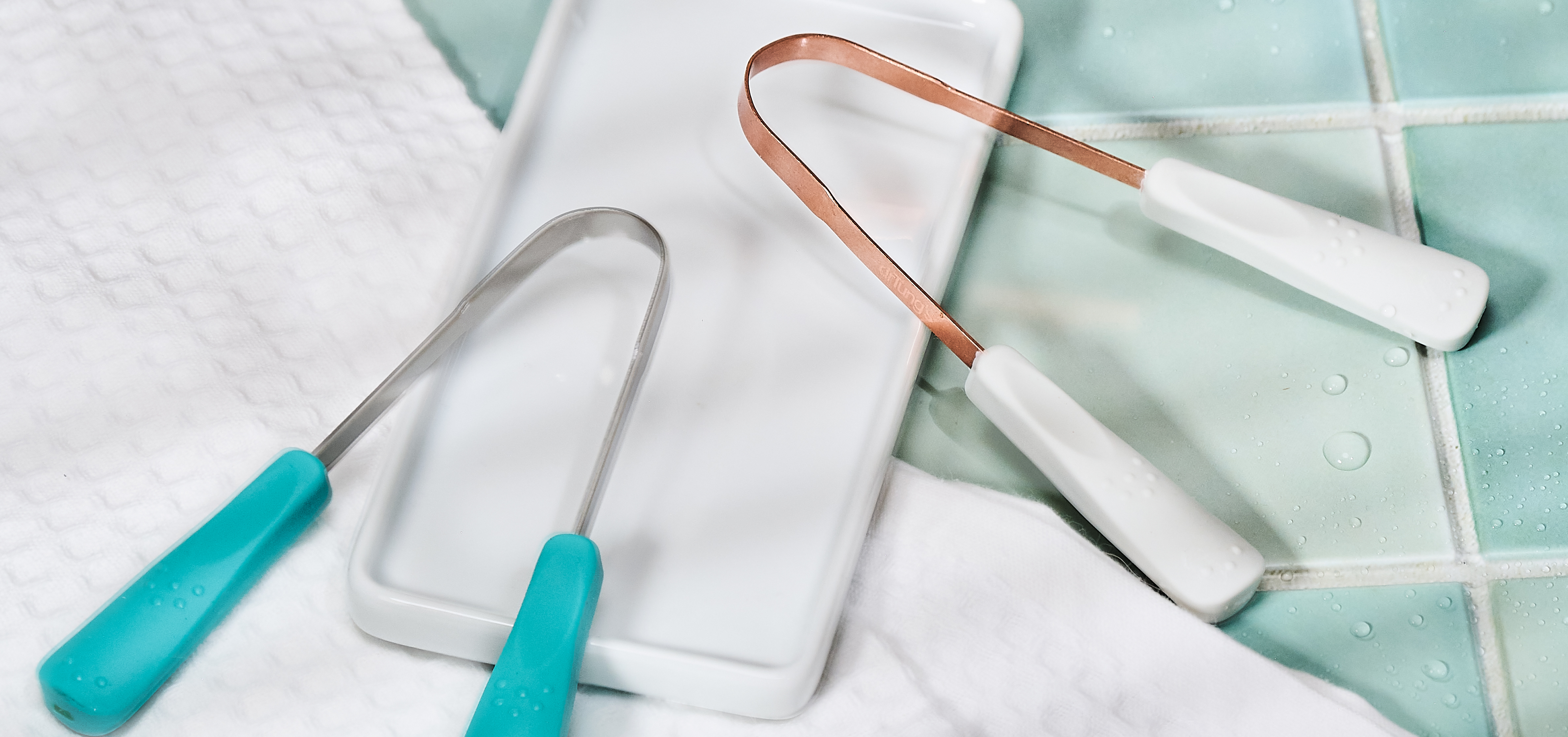
Copper tongue cleaner
Copper tongue scrapers are known for their natural antimicrobial properties and the vital enzymes they provide for maintaining a healthy balance of bacteria in the mouth. To ensure the longevity of copper tongue scrapers, it is important to clean them regularly and store them in a dry place to prevent tarnishing.
Stainless steel tongue scraper
On the other hand, stainless steel tongue scrapers are praised for their durability, affordability, and the absence of tarnishing. While they lack the inherent antibacterial properties of copper, they are a practical choice for users due to their robustness and ease of maintenance. Regular cleaning and proper care can ensure that stainless steel tongue scrapers last a long time.
For a tool that you regularly place into your mouth, your choice of material greatly matters—metals like stainless steel and copper are perfect.
That leaves us to talk about plastic…
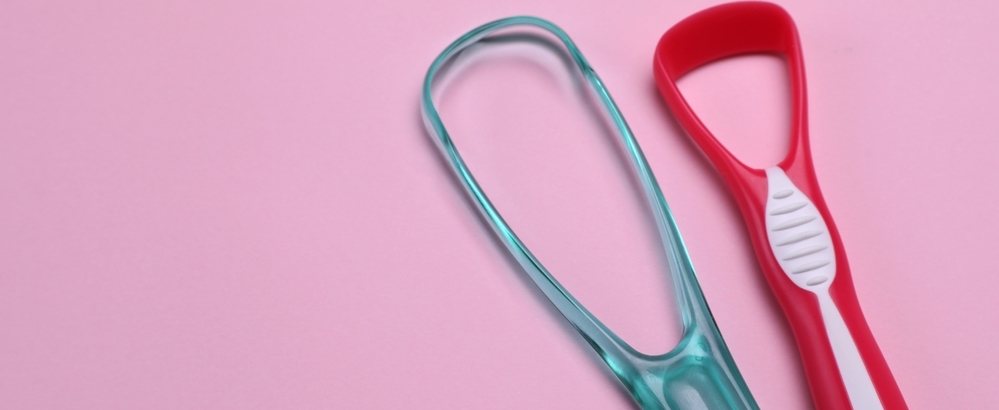
Plastic tongue scrapers — an important caution
A study published in the journal, Materials, gave insight into the different materials that repel or attract bacteria. Rough, irregular surfaces promote bacterial adhesion or ‘stickiness’, whereas smooth surfaces do not. Porous surfaces allow bugs to accumulate and thrive, dense materials don’t. Scratches or grooves allow bugs to cling and prosper.
Compared to metals, plastic is more easily damaged, more porous, and prone to scratching. This can make plastic tongue scrapers harder to keep clean and leave them harboring harmful bacteria. Not exactly something you want to put in your mouth every day. And it’s also why most people would rather eat with silverware rather than plasticware!
The tongue scraping takeaway
Make tongue scraping a daily habit to safely and effectively clean your tongue. It helps reduce bad breath, removes bacteria, prevents tooth decay, improves your sense of taste, and even kick-starts digestion. For the best results, use a stainless steel or copper tongue scraper as part of your oral care routine.
At DrTung's we offer both types of tongue cleaners: a stainless steel and a copper option. While both metals are impervious to bacteria, choosing the best one for you depends on personal preference. A stainless steel tongue scraper is a more durable metal and easily wipes down after each use. Copper is a softer metal and may feel more gentle on the tongue but does require a bit more care. It can develop a patina over time and you may wish to use a natural cleaning solution for occasional cleaning.
If you’d like to know more, we discuss why tongue scraping forms an important part of your dental hygiene routine in part one of this article. We also share exactly how to scrape your tongue correctly and the best routine order for optimal oral hygiene.
FAQs
Q: What is the best way to clean my tongue scraper?
A: We suggest cleaning the tongue scraper regularly — every few weeks — by rubbing it with water and baking soda paste (for stainless steel) or lemon juice and baking soda paste (for copper). This helps get rid of any residue or patina that may have built up.
Q: How do you use a tongue scraper?
A: Adding tongue scraping to your oral hygiene routine is a walk in the park. Here's a quick guide:
1) Stick your tongue out and hold the tongue cleaner with both hands.
2) Gently place the cleaner at the back of your tongue.
3) Using light pressure, pull the cleaner forward towards the tip of your tongue.
4) Rinse the cleaner after each pass to remove the collected debris.
5) Repeat until you've removed the milky coating and your tongue feels clean and refreshed.
Q: Does tongue scraping help with bad breath?
A: Bad breath, or halitosis, happens when the bacteria in your mouth get a little out of balance. While bacteria are naturally present, when certain types—like Streptococcus mutans—multiply too much, they can lead to plaque build-up and, you guessed it, that not-so-fresh breath. Scraping away that bad bacteria every morning helps eliminate build up resulting in fresher breath.

